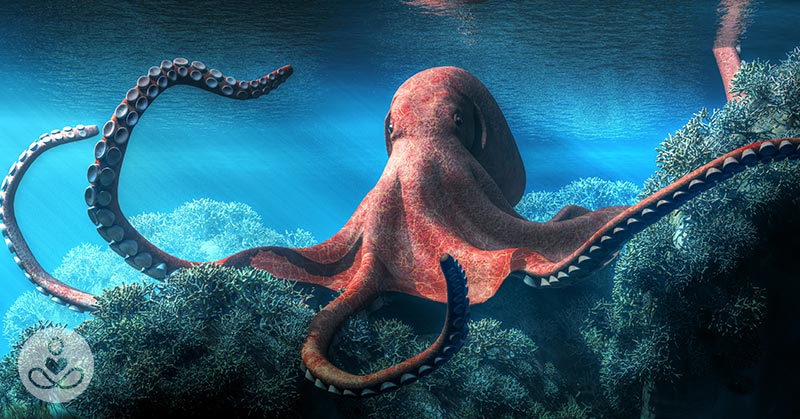There are a lot of risks to recognize when anything is being mass produced for the global market, especially when it comes to the livestock industry. Our demand for food is stripping the planet of resources, we’re manipulating nature, and creating irreversible damage. Overall our unethical choices come with a price and they may not be evident at first.
Our taste and desire for an eight-tentacled sea friend have grown, so much so that a group of scientists has published an article on the dangers of farming octopus, and why it should never be done. This is not just due to their high level of intelligence, more so because of the significant environmental impacts, such farms would manifest.
If you’re into octopus, you’re not alone. Global demand for this delicacy is on the rise, and prices are soaring accordingly, due to its limited supply. The Food and Agricultural Organization of the United Nations anticipates the price to remain high for the remainder of 2019.
Octopus is typically wild-caught, making yield unpredictable. In order to keep up with the demand, and create a reliable supply, octopus farms are beginning to pop up in multiple countries across the globe. These farms may include trials of genetic modification in order to speed up the process.
In this recent edition of Issues in Science and Technology, this group of environmental scientists, philosophers, and psychiatrists share how these farms are impacting our environment.
Like many other aquatic creatures, an octopus is a carnivore and they thrive on fish proteins and fatty acids, which make up their whole food diet. Where will all of this live food come from in octopus farming? As the researchers state “This will put additional pressure on wild fish and invertebrates for fishmeal”. Considering that around one-third of our global fish catch is turned into feed for animals, and about half of that goes to aquaculture. These practices are not sustainable.
While feed for farmed carnivorous aquatics is one of the biggest ecological concerns, environmental impacts from pollution are truly quite disturbing. A combination of high nitrogen and phosphorus levels which are found in feces and food decomposition; contamination from fertilizers, algaecides, herbicides, and disinfectants; excessive use of antibiotics; inbreeding and disease transmission between escaped fish and wild varieties are irreversible actions that we are imposing on our wildlife.
Octopuses are well known for their intelligence and problem-solving skills. They also prefer to spend their lives alone. We’ve observed octopuses perform impressive tasks, such as opening jars from the inside, making tools out of coconuts and shells, using rocks as weapons, camouflaging to mimic other creatures, and they remember puzzles that they’ve been given before. We’ve also discovered that octopuses are able to ignore their genetic programming and edit the messages sent from their DNA instead of following them almost exactly like most living things usually do.
In captive environments with no stimulation, these animals grow frustrated and bored. They’ve shown worrisome behaviors when captured, including cannibalism and eating the tips of their own tentacles.
“Right now, the farming of octopus is constrained by the technology – it has been difficult to reliably keep animals alive through the early stages in their lives. But with further investments, research, and testing, the technology may well become available to farm octopus at an industrial scale. It is our hope that if such an option does become practical, society will recognize the serious welfare and environmental problems associated with such projects and octopus farming will be discouraged or prevented. Better still would be for governments, private companies, and academic institutions to stop investing in octopus farming now and to instead focus their efforts on achieving a truly sustainable and compassionate future for food production”. Said in closing on this essay.
We should recognize the serious environmental impacts associated with octopus farming, and leave these animals alone. Experimentations with octopus farming in Mexico has reported a breakthrough in the last decade, and a Japanese seafood company reported successfully hatching eggs in 2017.
Is it worth it?
Sources
- Scientists Are Warning That We Absolutely Must Not Farm Octopuses https://www.sciencealert.com/scientists-are-warning-that-we-absolutely-must-not-farm-octopuses
- The Case Against Octopus Farming https://issues.org/the-case-against-octopus-farming/
- Octopus maya farming progresses in Yucatan https://fis.com/fis/worldnews/worldnews.asp?l=e&id=35971&ndb=1
- Fully-farmed octopus from Nissui to reach market as soon as 2020 https://www.seafoodsource.com/news/aquaculture/fully-farmed-octopus-from-nissui-to-reach-market-as-soon-as-2020

